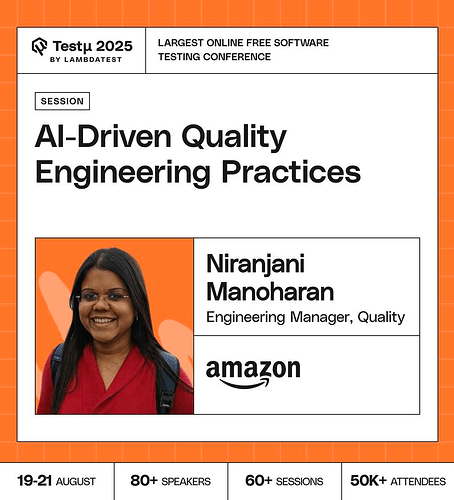Join Niranjani M., Engineering Manager - Quality at Amazon, will be taking the stage to explore the future of software testing.
Her session will focus on how AI observability platforms and serverless functions, combined with machine learning, can power intelligent test pipelines.
Don’t miss the chance to learn practical strategies to modernize your quality approach with cutting-edge techniques.
 Book your free spot now
Book your free spot now
How are AI-powered observability platforms changing the role of traditional QA in microservices architectures?
Could you talk a bit about the QA/ testing process in Amazon and practices are followed widely? Be it from testing AI or LLM or agents . Would be really insightful for everyone of us to understand.
With AI models suggesting failure patterns, how do we as QA professionals validate that the insights are accurate?
What are the most wanted skills for QA engineer now in Amazon?
How do you balance the complexity of building AI-powered failure analysis pipelines with the practical need for fast, reliable insights in dynamic microservices environments?
In my experience, learning starts with a culture of readiness. What cultural or organizational shifts are needed to adopt AI-driven quality engineering successfully?
You spoke about “Mapping data journey first?” May we know which tool do you use to do this? Since its one of the crucial thing to do before starting to write tests?
How is test failure analysis particularly challenging in distributed systems, and how does AI help?
In 2 years, will QA roles evolve more into AI supervisors than testers? Is that a future you’re ready for?
In an ecommerce space, how can AI help with Quality Engineering other than conventional regression testing?
How will this work in an extremely complex insurance domain with multi-day testing with data complexities in addition to env complexities?
How do AI-driven quality engineering practices, exemplified by neural quality insights, transform traditional QA methodologies by enabling predictive failure analysis, root cause identification, and proactive remediation in complex architecture
This requires solid DevOps and AI ML model building knowledge. How many in QA automation know this?
In AI-driven QA, how do we ensure fairness, compliance, and trust when models themselves can introduce hidden risks?
In 2 years, will QA roles evolve more into AI supervisors than testers? Is that a future you’re ready for?
How can AI reduce the cognitive load of testers and free them to focus on exploratory testing?
What inspired you to combine serverless functions with ML for test failure analysis?
In 2025, how can teams adapt AI-driven quality engineering practices to build better and faster software?
What are the biggest challenges in adopting AI for quality engineering, and how can they be mitigated?
